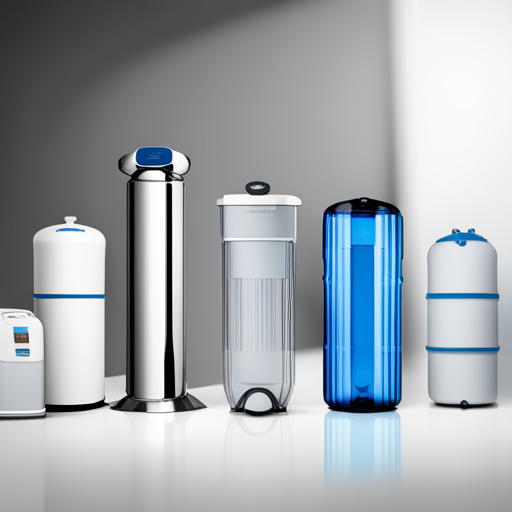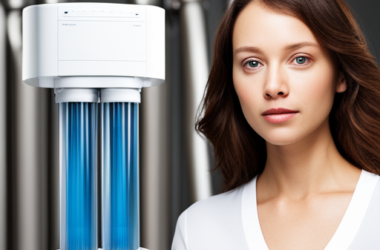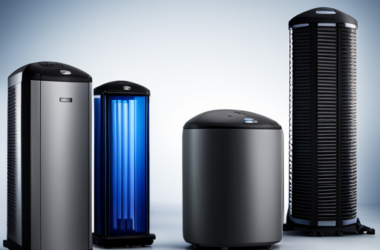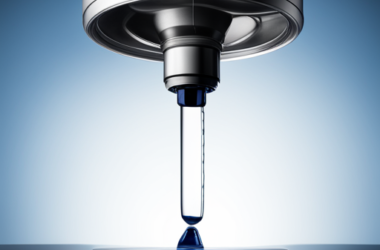Water filtration is an important process that ensures the quality of our drinking water. It is essential to remove impurities and contaminants from the water to make it safe for consumption. Water filtration systems come in various types, each with its unique features and benefits.
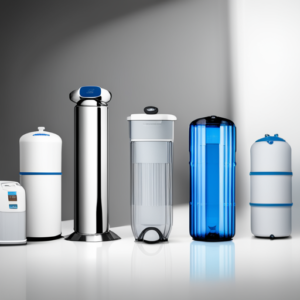
Contaminants and impurities in the water can cause health problems, such as gastrointestinal illnesses, reproductive problems, and neurological disorders. Water filtration systems can effectively remove harmful substances from the water, such as lead, chlorine, pesticides, and bacteria.
There are different types of water filtration systems available, including water filter pitchers, countertop water filters, under-sink water filters, whole-house water filters, faucet-mounted filters, and reverse osmosis water filters. Each type has its advantages and disadvantages, and choosing the right one depends on your specific needs and preferences.
Key Takeaways
- Water filtration is essential to ensure the quality of our drinking water and remove harmful contaminants and impurities.
- There are various types of water filtration systems available, each with its own unique features and benefits.
- Choosing the right water filtration system depends on your specific needs and preferences.
Water Filtration Systems
Water filtration systems are designed to remove impurities from water, ensuring that it is safe and healthy to drink. There are various types of water filtration systems available, each with its own unique features and benefits.
Types of Filters
The most common types of filters used in water filtration systems include activated carbon filters, reverse osmosis filters, and ceramic filters. Activated carbon filters work by absorbing impurities, such as chlorine and volatile organic compounds, from the water. Reverse osmosis filters use a semi-permeable membrane to remove impurities, including dissolved salts and minerals. Ceramic filters are made from porous ceramic material and work by trapping impurities as water passes through the filter.
Filtration Stages
Water filtration systems can have multiple stages of filtration, each designed to remove specific impurities. For example, a two-stage filtration system may have an activated carbon filter to remove chlorine and organic compounds, followed by a reverse osmosis filter to remove dissolved salts and minerals. A five-stage filtration system may include additional filters, such as a sediment filter to remove larger particles and a UV filter to kill bacteria and viruses.
Water Sources
The type of water source will determine the type of water filtration system needed. For example, well water may require a different type of filtration system than municipal water. Well water may contain high levels of minerals and bacteria, which can be removed with a reverse osmosis filter and a UV filter. Municipal water may contain chlorine and other chemicals, which can be removed with an activated carbon filter.
In conclusion, water filtration systems are an essential addition to any home or business that values clean and safe drinking water. With various types of filters and filtration stages available, it is important to choose the right water filtration system for your specific needs and water source.
Contaminants and Impurities
Water filtration is a process of removing contaminants and impurities from water to make it safe for consumption. The contaminants and impurities found in tap water can be classified into three main categories: chemicals and metals, bacteria and microorganisms, and sediment and particles.
Chemicals and Metals
Chemical contaminants include pesticides, lead, arsenic, cadmium, and mercury. These contaminants can enter the water supply through various sources, such as agricultural runoff, industrial waste, and old lead pipes. Chlorine is also added to tap water as a disinfectant, but it can react with organic matter to form harmful byproducts.
Heavy metals like lead, mercury, and cadmium can cause serious health problems if consumed in high amounts. Long-term exposure to arsenic has been linked to cancer, skin lesions, and cardiovascular disease.
Bacteria and Microorganisms
Bacteria and microorganisms are another category of contaminants that can be found in tap water. Giardia and Cryptosporidium are two types of parasites that can cause gastrointestinal illness. These parasites can enter the water supply through animal waste and human sewage.
Other bacteria like E. coli and coliform bacteria can also be present in tap water. These bacteria can cause diarrhea, nausea, and vomiting.
Sediment and Particles
Sediment and particles refer to any physical impurities present in tap water. Dirt, sand, rust, and other debris can enter the water supply through corroded pipes or natural sources. These impurities can affect the taste and appearance of the water.
Water filtration systems can remove these contaminants and impurities to provide clean and safe drinking water. Different types of filters are designed to remove specific contaminants, so it’s important to choose the right filter for your specific needs.
Water Filter Pitchers
Water filter pitchers are an affordable and convenient way to ensure that your drinking water is clean and free of contaminants. They are easy to use and require no installation, making them a popular choice for households. In this section, we will discuss the best water filter pitchers and how they work.
Best Water Filter Pitcher
When it comes to the best water filter pitcher, there are several models to choose from. The ZeroWater 10-Cup Pitcher is a popular choice, as it removes more contaminants than other pitchers on the market. It uses a five-stage filtration process that includes activated carbon and ion exchange resin to remove impurities and improve the taste of your water.
Another top-performing water filter pitcher is the Soma Pitcher. This pitcher is made from BPA-free plastic and features a plant-based filter that uses activated carbon to remove chlorine, odors, and other impurities. The Soma Pitcher has a sleek design and a large capacity, making it a great choice for families.
Pitcher Water Filter
A pitcher water filter is a type of filter that is designed to fit inside a water filter pitcher. These filters use activated carbon to remove impurities and improve the taste of your water. The filter capacity of a pitcher water filter can vary, so it’s important to choose a filter that meets your needs.
One of the most popular pitcher water filters is the Brita Pitcher Filter. This filter is designed to fit inside Brita water filter pitchers and uses activated carbon to remove impurities and improve the taste of your water. The Brita Pitcher Filter has a filter capacity of 40 gallons, making it a great choice for households.
In summary, water filter pitchers are an affordable and convenient way to ensure that your drinking water is clean and free of contaminants. The best water filter pitchers include the ZeroWater 10-Cup Pitcher and the Soma Pitcher, while the Brita Pitcher Filter is a popular choice for pitcher water filters. When choosing a water filter pitcher, consider factors such as filter capacity, taste, odors, and BPA-free plastic.
Countertop Water Filters
Countertop water filters are a popular choice for those who want to enjoy clean, filtered water without the hassle of installing an under-sink or whole-house filtration system. These filters are easy to install, require little maintenance, and are generally less expensive than other types of water filtration systems.
Best Countertop Filters
When it comes to choosing the best countertop water filter, there are a few factors to consider. The first is the flow rate, or how quickly the filter can produce clean water. Some filters have a slower flow rate than others, so if you need to filter a large amount of water quickly, you may want to choose a filter with a higher flow rate.
Another important factor is the type of filter used. Most countertop filters use activated carbon filters, which are effective at removing chlorine, sediment, and other contaminants. However, some filters may also use other types of filters, such as ceramic filters or reverse osmosis membranes, which can remove a wider range of contaminants.
Countertop Water Filter
One popular countertop water filter is the Aquasana Countertop Water Filter. This filter has a flow rate of 0.5 gallons per minute and uses a dual filtration system to remove chlorine, lead, and other contaminants. It is also easy to install and comes with a filter replacement reminder so you know when it’s time to replace the filter.
Another option is the Waterdrop Countertop Filter System, which has a flow rate of 0.5 gallons per minute and uses a 5-stage filtration system to remove heavy metals, chlorine, and other contaminants. This filter is also easy to install and has a long lifespan, with each filter lasting up to 8,000 gallons.
Overall, countertop water filters are a convenient and effective way to enjoy clean, filtered water at home. With a variety of options available, it’s easy to find a filter that fits your needs and budget.
Under-Sink Water Filters
Under-sink water filters are an effective way to ensure that the water you drink is safe and clean. They are installed directly under the sink and filter water as it passes through the system. In this section, we will discuss the best under-sink filters and everything you need to know about under-sink water filters.
Best Under-Sink Filters
There are many different types of under-sink filters available on the market. Here are some of the best options:
- Multipure Aquaversa MP750: This is a compact under-sink water filter that uses activated carbon to remove contaminants. It is easy to install and has a long filter life.
- Brondell Circle Reverse Osmosis Under-Sink Water Filter: This reverse osmosis system removes up to 99% of contaminants, including lead, chlorine, and arsenic. It has a compact design and is easy to install.
- Aquasana 3-Stage Under Sink Water Filter System: This system uses a three-stage filtration process to remove contaminants, including chlorine, lead, and cysts. It is easy to install and has a long filter life.
Under-Sink Water Filter
Under-sink water filters are an excellent way to ensure that your drinking water is clean and safe. They are easy to install and can remove a wide range of contaminants, including lead, chlorine, and sediment.
Installation is typically straightforward, and most filters come with detailed instructions. However, it is important to ensure that you have the necessary plumbing skills before attempting to install the filter.
Maintenance is also an essential aspect of under-sink water filters. Regular filter replacement is necessary to ensure that the filter continues to work correctly. Most filters require replacement every six months to a year, depending on the type of filter and the amount of water used.
Reverse osmosis is a popular filtration method used in under-sink water filters. This method uses a semi-permeable membrane to remove contaminants from the water. It is highly effective and can remove up to 99% of contaminants.
Activated carbon is another common filtration method used in under-sink water filters. This method uses carbon to adsorb contaminants from the water. It is effective at removing chlorine, sediment, and some organic compounds.
In conclusion, under-sink water filters are an excellent way to ensure that your drinking water is clean and safe. They are easy to install and maintain and can remove a wide range of contaminants. When choosing an under-sink water filter, it is essential to consider the type of filter, filter replacement, and installation requirements.
Whole-House Water Filters
When it comes to ensuring clean and safe water throughout your home, whole-house water filters are an effective solution. These filters are installed at the main water supply line, purifying all the water that enters your home. In this section, we will discuss the best whole-house water filters and how they work.
Best Whole-House Filters
There are several types of whole-house water filters available on the market. Let’s take a look at some of the best options:
- Express Water Whole House Water Filtration System: This system has a 3-stage filtration process and can filter up to 100,000 gallons of water. It removes contaminants like chlorine, sediment, and rust from your water supply.
- Aquasana Rhino 1,000,000 Gallons Water Filtration System: This system is a bit of a splurge, but it’s worth it if you want the best filtration possible. It can filter up to 1,000,000 gallons of water and removes 97% of chlorine, as well as other contaminants like lead and mercury.
- GE High Flow Water Filtration System: This budget-friendly option is easy to install and can filter up to 3 months’ worth of water. It removes sediment, chlorine, and other contaminants from your water supply.
Whole-House Water Filter
A whole-house water filter is a plumbing device that purifies all the water that enters your home. These filters are typically installed at the main water supply line and can remove contaminants like sediment, chlorine, and other impurities. They can also help preserve minerals that are beneficial for your health.
When choosing a whole-house water filter, it’s important to consider the filter capacity and the types of contaminants it can remove. Some filters are designed to remove specific contaminants, while others have a broader range of filtration capabilities.
In conclusion, whole-house water filters are an effective way to ensure clean and safe water throughout your home. By choosing the right filter for your needs, you can enjoy filtered water that’s free of contaminants and full of beneficial minerals.
Faucet-Mounted Filters
Faucet-mounted filters are an affordable and convenient way to get filtered water straight from your tap. They are easy to install and can remove a wide range of contaminants from your water, including chlorine, lead, and sediment.
Best Faucet Filters
When it comes to choosing the best faucet filter, there are a few key factors to consider, including flow rate, filter type, and filter replacement frequency. Here are some of our top picks for the best faucet filters on the market:
| Faucet Filter | Flow Rate | Filter Type | Filter Replacement |
|---|---|---|---|
| PUR Plus Faucet Mount Filtration System | 0.5 GPM | Activated Carbon | Every 3 months |
| Waterdrop Faucet Mount Water Filtration System | 0.5 GPM | Activated Carbon + PP Cotton | Every 6 months |
| Culligan FM-25 Faucet Mount Filter | 0.5 GPM | Carbon Block | Every 2 months |
The PUR Plus Faucet Mount Filtration System is a popular choice due to its high contaminant removal rate, including lead, chlorine, and microbial cysts. The Waterdrop Faucet Mount Water Filtration System is another great option, with a longer filter replacement frequency and a multi-stage filtration process. The Culligan FM-25 Faucet Mount Filter is a budget-friendly choice that still provides effective filtration.
Faucet Filter
Faucet filters typically use activated carbon to remove contaminants from water. Activated carbon is a highly porous material that can attract and trap impurities, such as chlorine and sediment, as water flows through the filter. Some faucet filters also use additional filtration methods, such as ceramic or ion exchange, to provide even more comprehensive filtration.
It is important to note that faucet filters do have a limited lifespan and will need to be replaced periodically. The frequency of filter replacement will depend on the specific filter and how much water you use, but most filters will need to be replaced every 2-6 months. It is important to follow the manufacturer’s guidelines for filter replacement to ensure that your faucet filter is providing optimal filtration.
Reverse Osmosis Water Filters
Reverse Osmosis (RO) water filtration is a highly effective method for purifying drinking water. It works at the molecular level to remove impurities and contaminants, providing clean and safe drinking water. In this section, we will discuss the best reverse osmosis filters and the reverse osmosis water filter.
Best Reverse Osmosis Filters
When it comes to choosing the best reverse osmosis filter, there are a few things to consider, such as flow rate, safety, and experts’ recommendations. Here are some of the best reverse osmosis filters in the market:
| Reverse Osmosis Filter | Flow Rate | Safety | Experts’ Recommendation |
|---|---|---|---|
| APEC Water Systems ROES-50 Essence Series | 50 GPD | NSF Certified | Highly Recommended |
| Express Water RO5DX Reverse Osmosis Filtration | 50 GPD | NSF Certified | Best Value |
| iSpring RCC7AK 6-Stage | 75 GPD | NSF Certified | Best for Alkaline Water |
Reverse Osmosis Water Filter
The reverse osmosis water filter is a highly effective filtration system that uses a semi-permeable membrane to remove impurities and contaminants from water. The reverse osmosis water filter is installed under the sink and connected to the cold water line. The water is then filtered through the membrane and stored in a tank until it is needed.
Installation of a reverse osmosis water filter can be done by a professional or by the homeowner. However, it is recommended to have a professional install the system to ensure it is done correctly. Maintenance of the system is also important, and it is recommended to replace the filter every six months.
Activated carbon is also used in reverse osmosis water filters to remove chlorine and other chemicals from the water. This helps to improve the taste and odor of the water. Filter replacement is also important to ensure the system continues to function correctly.
In conclusion, reverse osmosis water filters are highly effective in providing clean and safe drinking water. With proper installation, maintenance, and filter replacement, the system can provide years of reliable service.
Certifications and Standards
When it comes to water filtration, certifications and standards play a crucial role in ensuring the safety and quality of the water that we drink. In this section, we will discuss the two main aspects of certifications and standards: NSF/ANSI Standards and Certified Labs.
NSF/ANSI Standards
The NSF/ANSI Standards are a set of guidelines that have been developed by the National Sanitation Foundation (NSF) and the American National Standards Institute (ANSI) to regulate the safety and quality of water filtration products. These standards are not mandatory, but they are widely recognized and accepted by the industry as a benchmark for quality.
There are several NSF/ANSI Standards that are relevant to water filtration products, including:
- NSF/ANSI 42: This standard certifies that a filter is capable of reducing the aesthetic impurities in water, such as chlorine and taste/odor.
- NSF/ANSI 53: This standard certifies that a filter is capable of reducing the health-related contaminants in water, such as lead, mercury, and pesticides.
- NSF/ANSI 58: This standard certifies that a reverse osmosis (RO) system is capable of reducing a wide range of contaminants in water.
- NSF/ANSI 401: This standard certifies that a filter is capable of reducing emerging contaminants in water, such as pharmaceuticals and personal care products.
Certified Lab
In addition to the NSF/ANSI Standards, it is also important to look for water filtration products that have been tested and certified by a certified lab. A certified lab is a third-party organization that conducts independent testing on water filtration products to ensure that they meet the standards and guidelines set by regulatory bodies such as the EPA.
The Environmental Working Group (EWG) is an example of a certified lab that conducts independent testing on water filtration products. They provide a Water Filter Buying Guide that rates different products based on their ability to remove contaminants and their overall performance.
Some popular water filtration brands that have been certified by certified labs include Aquasana, Aquagear, Aquatru, and Water Filter Ratings.
By choosing water filtration products that meet the NSF/ANSI Standards and have been certified by a certified lab, you can ensure that you are drinking safe and high-quality water. If you have any questions or concerns about the safety of your drinking water, you can contact the Safe Drinking Water Hotline for more information.
Frequently Asked Questions
What are the different types of water filtration systems available?
There are several types of water filtration systems available, including activated carbon filters, reverse osmosis systems, UV water purifiers, and ceramic filters. Each type of system has its own unique advantages and disadvantages, and the best system for your needs will depend on your specific water quality concerns and usage requirements.
How often should you replace the filter in a water filtration system?
The frequency with which you should replace the filter in your water filtration system will depend on several factors, including the type of system you have, the quality of your water, and how often you use the system. In general, most filters should be replaced every 6 to 12 months, but it’s important to follow the manufacturer’s recommendations for your specific system.
What contaminants can a water filtration system remove?
The contaminants that a water filtration system can remove will depend on the type of system you have. However, most systems are capable of removing common contaminants such as chlorine, lead, mercury, and pesticides. Some systems can also remove bacteria and viruses, while others are designed to remove specific contaminants such as fluoride or nitrates.
Can a water filtration system remove bacteria and viruses?
Yes, some water filtration systems are capable of removing bacteria and viruses from your water. UV water purifiers, for example, use ultraviolet light to kill bacteria and viruses, while reverse osmosis systems use a semi-permeable membrane to filter out these contaminants. It’s important to choose a system that is designed to remove the specific contaminants that are present in your water.
What is reverse osmosis and how does it work in water filtration?
Reverse osmosis is a water filtration process that uses a semi-permeable membrane to remove contaminants from your water. The membrane allows water molecules to pass through, while blocking larger molecules such as minerals, bacteria, and viruses. Reverse osmosis systems typically include several stages of filtration, including sediment filters, activated carbon filters, and the semi-permeable membrane.
What factors should be considered when choosing a water filtration system for well water?
When choosing a water filtration system for well water, it’s important to consider factors such as the quality of your water, the specific contaminants that are present, and your usage requirements. Some common contaminants found in well water include bacteria, iron, sulfur, and nitrates, so it’s important to choose a system that is designed to address these specific issues. Additionally, you may want to consider factors such as the size and capacity of the system, the maintenance requirements, and the cost of operation.

